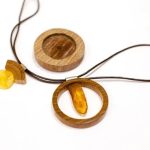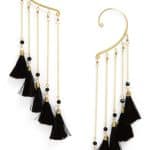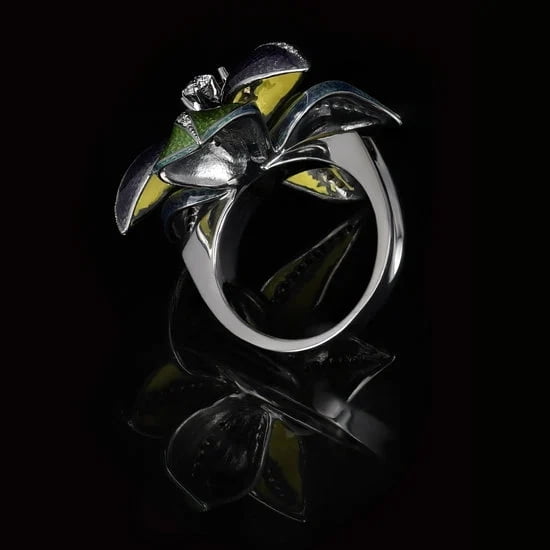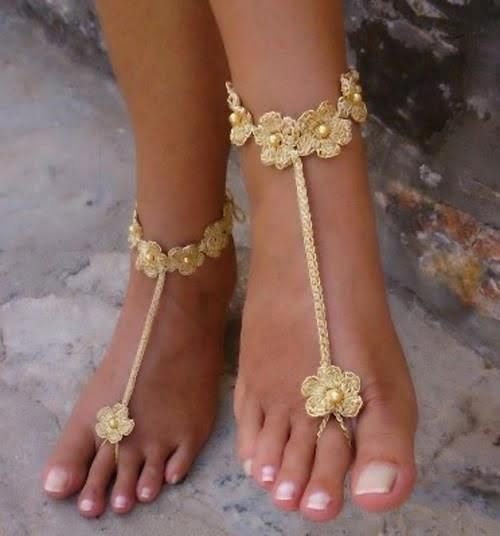When it comes to creating unique and intricate jewelry pieces, the use of jewelry metal bead caps plays a crucial role. These small but significant components add an element of sophistication and elegance to any design, enhancing the overall look of the finished piece. Whether you are a seasoned jewelry maker or a beginner looking to experiment with new techniques, understanding the importance of bead caps in jewelry making is essential.
The history of bead caps can be traced back to ancient civilizations where they were used as decorative elements to embellish various types of jewelry. Over time, bead caps have evolved into an essential component of modern jewelry design, offering a wide range of styles and materials to choose from. From simple and subtle designs to intricate and ornate styles, bead caps come in various shapes and sizes, making them versatile additions to any jewelry project.
One of the key aspects that set metal bead caps apart is the variety of metals used in their creation. From sterling silver and gold-plated brass to copper and pewter, each metal brings its unique qualities to the table.
The choice of metal can greatly impact the overall look and feel of the jewelry piece, adding a touch of personalization and style. In the following sections, we will delve deeper into the different types of metals commonly used in bead cap production and explore the benefits that metal bead caps bring to your jewelry designs.
A Brief History of Bead Caps
The history of bead caps dates back centuries, with origins in ancient civilizations such as Egypt and Mesopotamia. These early societies used intricate metal bead caps to embellish their jewelry pieces, adding a touch of elegance and sophistication. The use of bead caps in jewelry design continued to evolve over time, with different cultures incorporating unique styles and techniques into their creations.
One of the earliest known examples of bead caps can be found in Egyptian jewelry from the Pharaonic period. These bead caps were often made from precious metals such as gold and silver, intricately detailed with symbols and motifs significant to the wearer. In Mesopotamia, bead caps were commonly used in necklaces and bracelets, showcasing the craftsmanship and artistry of the ancient artisans.
As trade routes expanded and technology advanced, the popularity of bead caps spread to various parts of the world. Metalworkers began experimenting with different metals such as copper, bronze, and brass to create intricate bead caps that added beauty and flair to jewelry pieces. Today, bead caps are still widely used in jewelry making, with modern artisans drawing inspiration from traditional designs while incorporating contemporary elements into their creations.
| Important | Data |
|---|---|
| Origin | Egypt & Mesopotamia |
| Metal Types | Gold, Silver, Copper, Bronze |
Types of Metals Used in Bead Caps
When it comes to creating jewelry with bead caps, the type of metal used can greatly impact the overall look and feel of the piece. There are various metals commonly used in making bead caps, each with its own unique characteristics and appeal. Here are some of the most popular metals used in creating bead caps for jewelry:
- Brass: Brass is a versatile metal that is often used in making bead caps due to its durability and affordability. It has a warm golden color that adds a touch of elegance to any jewelry design.
- Sterling Silver: Sterling silver is a classic choice for bead caps as it creates a timeless and luxurious look. It is known for its bright luster and versatility in jewelry making.
- Gold-Filled: Gold-filled metal bead caps offer the look of real gold at a more affordable price point. They are durable and long-lasting, making them a popular choice for high-end jewelry pieces.
In addition to these commonly used metals, there are also options such as copper, pewter, and aluminum that can be utilized to create unique and eye-catching bead caps for your jewelry designs. Each metal brings its own strengths and aesthetic qualities to the table, allowing you to choose the perfect bead caps based on your personal style preferences and budget.
Whether you prefer the luxurious shine of sterling silver or the warm tones of brass, selecting the right metal bead caps is crucial in creating stunning jewelry pieces. Consider factors such as durability, color, cost, and overall design aesthetic when choosing the best metal for your bead caps. Experimenting with different metals can lead to exciting results and help you discover new possibilities in your jewelry-making endeavors.
Benefits of Using Metal Bead Caps
Metal bead caps are essential components in jewelry making that not only serve a functional purpose but also add an aesthetic touch to the overall design. These small, decorative pieces are often used to complement and enhance the beauty of beads in various jewelry projects. From adding a finishing touch to hiding knots and connecting different elements, bead caps play a significant role in creating unique and eye-catching pieces of jewelry.
Enhanced Aesthetics
One of the main benefits of using metal bead caps in jewelry designs is that they can instantly elevate the look of your piece. Whether you’re working with glass beads, pearls, or gemstones, incorporating metal bead caps can add a touch of sophistication and elegance to your design. The intricate patterns, textures, and finishes of metal bead caps can bring a sense of luxury to your creations, making them stand out from mass-produced pieces.
Durability and Longevity
Another advantage of using metal bead caps in jewelry making is their durability and longevity. Unlike plastic or acrylic alternatives, metal bead caps are more robust and resistant to wear and tear. This means that your jewelry pieces will maintain their beauty over time, even with regular wear. Additionally, metal bead caps are less likely to fade or discolor, ensuring that your creations remain as stunning as the day you made them.
How to Choose the Right Metal Bead Caps
When it comes to selecting the right metal bead caps for your jewelry project, there are several factors to consider in order to achieve the desired look and feel. One of the first things to take into account is the type of metal used in the bead caps. Common metals include sterling silver, gold, brass, copper, and pewter, each offering its own unique characteristics that can significantly impact the overall design of your jewelry piece.
Sterling silver bead caps are a popular choice due to their versatility and classic appeal. They are durable, easy to work with, and complement a wide range of beads. Gold bead caps add a touch of luxury and elegance to any jewelry piece, making them ideal for creating statement accessories.
Brass and copper bead caps have a warm hue that can give your design a vintage or bohemian look. Pewter bead caps are lightweight and affordable, making them suitable for both casual and formal designs.
In addition to considering the type of metal, think about the size and shape of the bead caps. Larger bead caps may overpower delicate beads, while smaller ones might not provide enough accentuation. The shape of the bead cap can also influence the overall aesthetic-ornate floral designs can add a romantic touch, while sleek geometric shapes create a modern feel. Ultimately, choose metal bead caps that enhance your jewelry design and reflect your personal style.
For those who want to experiment with mixing metals in their jewelry pieces, don’t be afraid to blend different types of metal bead caps together for a unique look. Mixing silver and gold can create an elegant contrast, while combining brass with copper offers a rich color palette. By carefully selecting and pairing metal bead caps with your beads, you can elevate your jewelry-making projects from simple accessories to stunning works of art.
| Type | Characteristics |
|---|---|
| Sterling Silver | Versatile, classic appeal |
| Gold | Luxurious, elegant |
| Brass/Copper | Warm hue for vintage/bohemian look |
| Pewter | Lightweight, affordable |
Design Inspiration
Metal bead caps are a versatile and stylish addition to any jewelry piece, adding a touch of intricacy and elegance. When it comes to design inspiration, there are endless possibilities for incorporating these unique components into your creations. From delicate dangles to statement necklaces, metal bead caps can truly elevate the aesthetic appeal of your jewelry.
Classic Elegance
One way to incorporate metal bead caps into your designs is by opting for classic elegance. Consider using silver or gold bead caps in a simple yet sophisticated necklace or bracelet. Pair them with pearls or gemstones for a timeless look that exudes grace and refinement. The subtle shine and intricate details of the bead caps will add a touch of opulence to your jewelry pieces.
Bohemian Vibes
For those who prefer a more relaxed and bohemian style, metal bead caps can also play a key role in achieving that aesthetic. Mix different metal finishes like brass or copper with natural materials such as wooden beads or leather cords for a laid-back yet chic vibe. Experiment with various shapes and sizes of bead caps to create an eclectic and personalized jewelry piece that reflects your individuality.
Modern Edge
If you’re looking to add a modern twist to your jewelry designs, consider using sleek and minimalist metal bead caps in geometric shapes. Opt for gunmetal or rose gold finishes for a contemporary feel. Combine them with glass beads or crystals for a striking contrast that catches the eye. The clean lines and metallic sheen of the bead caps will give your creations a fresh and edgy look that is perfect for those with a fashion-forward style.
DIY Tutorial
Creating your own jewelry using metal bead caps can be a fun and rewarding experience. With just a few supplies and some creativity, you can design unique pieces that showcase your personal style. Follow this step-by-step guide to start crafting your own beautiful jewelry with metal bead caps:
Materials Needed
- Metal bead caps in desired size and shape
- Beads in various colors and sizes
- Jewelry wire or thread
- Jewelry pliers
- Clasps and jump rings (if making a necklace or bracelet)
- Optional: charms, pendants, or other embellishments
Step 1: Choose Your Bead Caps
Start by selecting the metal bead caps you want to use for your jewelry project. Consider the size, shape, and color of the beads you plan to pair them with to ensure they complement each other. Metal bead caps come in a variety of finishes such as silver, gold, copper, brass, and more, so choose the one that best suits your design aesthetic.
Step 2: Prepare Your Beads
String your beads onto the jewelry wire or thread in your desired pattern. You can mix and match different colors, sizes, and shapes to create a unique look. Make sure to leave enough space at the ends for attaching the bead caps and clasps. Once your beads are arranged as you like, it’s time to add the metal bead caps.
Step 3: Add the Bead Caps
Slide a metal bead cap onto each end of your string of beads. Gently press the bead cap against the last bead to secure it in place. This will not only add a decorative element to your design but also help hold everything together. You may also choose to use multiple layers of bead caps for a more intricate look.
By following these simple steps, you can create stunning jewelry pieces using metal bead caps that reflect your personal style and creativity. Experiment with different designs, shapes, and colors to craft one-of-a-kind accessories that are sure to make a statement. Enjoy the process of designing and creating beautiful jewelry that you can wear with pride.
Maintenance and Care Tips
In conclusion, incorporating metal bead caps into your jewelry designs can add a touch of elegance and sophistication. These versatile components not only provide a polished finish to your creations but also offer durability and longevity. By understanding the history and types of metals used in bead caps, you can choose the right ones for your projects with ease.
When it comes to caring for jewelry pieces adorned with metal bead caps, there are some essential tips to keep in mind. Firstly, regular cleaning is important to prevent any tarnishing or dulling of the metal. Use a soft cloth or a gentle jewelry cleaner specifically designed for metal components to remove any dirt or residue. Additionally, storing your jewelry pieces in a cool, dry place away from direct sunlight can help maintain the luster of the bead caps.
Ultimately, by following these maintenance and care tips, you can ensure that your jewelry pieces with metal bead caps remain beautiful and pristine for years to come. Whether you are creating your own designs or purchasing ready-made pieces, the timeless appeal of metal bead caps will continue to be a popular choice in the world of jewelry making.
So don’t hesitate to experiment with different metals and design combinations to create stunning and unique accessories that truly stand out.
Frequently Asked Questions
What Is Bead Cap in Jewelry Making?
In jewelry making, a bead cap is a small decorative component that is used to cover and enhance the appearance of beads. Bead caps come in various designs, shapes, and sizes to add a touch of elegance or whimsy to a piece of jewelry.
How Do You Attach Bead Caps to Jewelry?
Attaching bead caps to jewelry can be done in several ways depending on the design and purpose of the piece. One common method is to glue the bead cap onto the bead using jewelry adhesive. Another method is to wire-wrap or string the bead with the cap onto a headpin or eye pin.
How Do You Measure a Bead Cap?
Measuring a bead cap involves taking into account both its diameter and height. The diameter is measured at the widest point across the bottom of the cap, while the height is measured from the base to the top of the cap. These measurements help ensure that the bead cap fits properly with the chosen beads in your jewelry design.

Welcome to my jewelry blog! My name is Sarah and I am the owner of this blog.
I love making jewelry and sharing my creations with others.
So whether you’re someone who loves wearing jewelry yourself or simply enjoys learning about it, be sure to check out my blog for insightful posts on everything related to this exciting topic!





